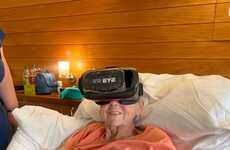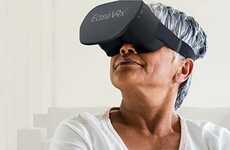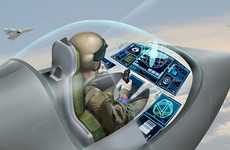
An Immersive Form of PTSD Therapy Gets Veterans to Relive Trauma
Alyson Wyers — June 11, 2014 — Lifestyle
References: ict.usc.edu & fastcoexist
A virtual reality form of PTSD therapy gets veterans to experience the sounds, smells and feelings of an IED with the support to help them heal.
Research performed by the University of Southern California's Institute for Creative Technology resulted in the Bravemind system, which recreates traumatic events for the former soldiers. The PTSD therapy system consists of a 360-degree headset, a standard issue video game controller, a haptic plate and a smell kit capable of emitting scents such as burning plastic, diesel fuel and body odor.
Typically exposure therapy sessions involve therapists talking patients through guided experiences where they originally faced a traumatic event. USC's ICT in collaboration with partners in the American military and a Canadian veteran support group called True Patriot Love are looking into whether this immersive form of exposure therapy will be helpful for PTSD-suffering soldiers.
Research performed by the University of Southern California's Institute for Creative Technology resulted in the Bravemind system, which recreates traumatic events for the former soldiers. The PTSD therapy system consists of a 360-degree headset, a standard issue video game controller, a haptic plate and a smell kit capable of emitting scents such as burning plastic, diesel fuel and body odor.
Typically exposure therapy sessions involve therapists talking patients through guided experiences where they originally faced a traumatic event. USC's ICT in collaboration with partners in the American military and a Canadian veteran support group called True Patriot Love are looking into whether this immersive form of exposure therapy will be helpful for PTSD-suffering soldiers.
Trend Themes
1. Virtual Reality Therapy - Exploring the use of virtual reality technology as a form of therapy for PTSD sufferers.
2. Immersive Exposure Therapy - Utilizing immersive experiences to recreate traumatic events and aid in the healing process for individuals with PTSD.
3. Multi-sensory Therapy - Integrating various senses, such as sound, smell, and touch, into therapy to enhance the immersive experience for PTSD patients.
Industry Implications
1. Healthcare - Implementing virtual reality therapy as a potential treatment option in mental health facilities and hospitals.
2. Gaming - Creating specialized virtual reality gaming equipment and software tailored for therapeutic purposes.
3. Military - Partnering with the military to develop and deploy virtual reality exposure therapy systems for soldiers with PTSD.
3.5
Score
Popularity
Activity
Freshness























